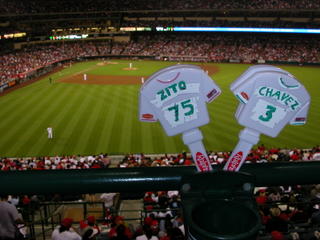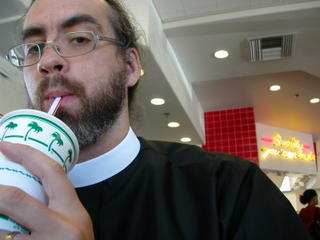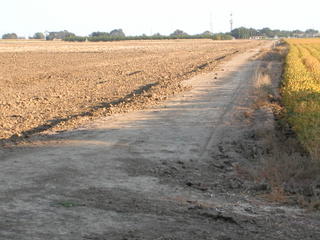I know that fear the disciples knew, when they were in their boat on that choppy sea. I've been on the lake when you can feel that the hard rain is about to turn to hail, and the wind is so strong that you're not sure if you could get to shore if you wanted to. I've been on the lake when the wind is so strong that you're not sure if you could keep yourself from the rocky shore, if that was what you wanted to.
I imagine you know this fear, the fear that comes when you don't know what is coming next, or the fear that comes when you do know what is coming next, but would prefer not to know it.
But the fear the disciples felt was not just about the weather.
They were also afraid because when they looked out upon the sea they thought they saw a phantasm, a ghost. Someone, or something, that they didn't know.
The bad weather is one thing, not knowing what is coming next is one thing, but the possibility of a nether-worldly visitation probably doesn't help a stressful situation.
But what happens next, according to Matthew, is that Jesus immediately speaks to them and says
'Take heart, it is I; do not be afraid.'"
By this Jesus says two important things about who he is.
He says that he is not a ghost, he is not someone to fear, he is the friend they know and love.
He says that he is the very same person that they know from his call to follow, the one they know from the voice of his teaching, the one they know from the meals they shared.
But he says another thing at the same time, with the same words: He doesn't just say that he is the one they know, but in his call to them he claims the divine name, the name spoken to Moses though the burning bush.
Jesus says "It is I, the one you know," as he says "I am."
And this tells us something important about who Jesus is; he is the one who walked the dusty roads of Galilee, and he is the Lord of the earth we walk upon.
He is the one who walks on the water in the storm, and he is the Lord of the water and what is in it, the Lord of the stormy sea.
Peter says to Jesus, once he thinks it might be his friend, "Lord, if it is you, command me to come to you on the water."
Peter's response to Jesus is an act of faith, an act of faith in Jesus.
Peter does not say, "Well Jesus if you can do it, I will surely do it too."
Peter is not the little engine that could, as if miracles are won by self-confidence. Peter is not saying to himself, "I think I can . . . walk on the water, I think I can . . . walk on the water . . ."
Because this kind of self-confidence is just another form of idolatry, the idolatry of the self. What Peter doesn't show is self-confidence, but God confidence, Jesus confidence.
Peter's confidence is in the Holy one of Israel, the one walking on the water.
And let's not miss two ironies in Peter's sinking, two things that give us some insight into the Christian life.
Peter is distracted by the wind, and becomes frightened by it.
Has Jesus not just claimed that he made the wind, the storm, the world and all that is in it?
Peter becomes afraid of exactly what the one he has just claimed faith in has power over.
The other irony is that the wind should be the least of his worries.
The greater danger when you are walking in the water is drowning.
The wind might mess up your hair. But the water will come between you and what gives you life.
The Christian life can be like this, too. We become distracted by things that really should worry us least, and we miss the things that should worry us most.
I know that I worry about car payments, I worry about what to wear, I worry about what people think of me.
And these worries keep me from examining larger issues in my life, like my walk with God, and my own problems of faith and belief, my own sin, my own temptations.
But even in these larger problems, when we are at sea without a boat or even a life preserver, when our very life is in danger, Jesus reaches out his hand to us, and does not save us from this storm.
Jesus saves us in the storm.
The order of events in the story is important: Jesus walks on the water, in the storm. Peter walks on the water, in the storm. Jesus lifts Peter out of the sea, in the storm.
And only then does Jesus calm the storm. Jesus does not come to us when the lake is like glass, when all things are well in the world, at least not in this story - Jesus comes when the rain is about to turn to hail, you are out of your boat, and sinking fast.
This is the life of faith: to live in a world where the one who is fully human, and fully God, reaches out to us in our moment of despair.
Faith is about living in a world where the one we worship is not ourselves, but the Lord of the sea and what is in it, the one who can quell the storm upon it.
A world where it is our Saviour, the Son of God, human and divine, the one who abolishes sin and even our lack of faith, who is reaching out his hand.
A world where we are surprised, a world where miracles can happen, not just because the bible tells us so, but because in a world where Jesus, and even Peter, can walk on water, there is a little more hope for me, and for the world, because odd, strange, and new things can happen.
This is my hope; for a world in which we have faith, a faith in this strange man, who is God, who walks on the water, saves us from ourselves, not from the storm, but in the storm, the one who gives us our faith in him, by bringing us up into life with Him.
 I was a little nervous. Sure, I can talk big. "Look for the beer-soaked boy, that might be me," I wrote. But after getting into the A's gear, and then in the car, I was a little nervous. Grace and I had gone to the Rite-Aid for white-out and a green marker. But did I have the guts to cheer for the green and gold in the sea of red? Would I commit the treason of defacing the Vladimir Guerrero clacker?
I was a little nervous. Sure, I can talk big. "Look for the beer-soaked boy, that might be me," I wrote. But after getting into the A's gear, and then in the car, I was a little nervous. Grace and I had gone to the Rite-Aid for white-out and a green marker. But did I have the guts to cheer for the green and gold in the sea of red? Would I commit the treason of defacing the Vladimir Guerrero clacker? So we defaced our clackers. I converted mine to read Chavez, Joe did his to read Zito.
So we defaced our clackers. I converted mine to read Chavez, Joe did his to read Zito.






